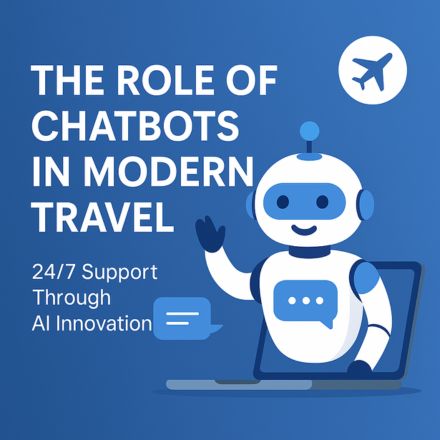The travel industry has always been a fast-moving, customer-centric domain—but in today’s digital age, speed, convenience, and personalization are not just preferences; they’re expectations. To meet these demands, companies are turning to cutting-edge technologies such as chatbot integration and travel automation. The travel industry has always thrived on innovation. From the introduction of online booking systems to the use of mobile apps for check-ins and travel planning, technology continues to reshape how people explore the world. AI-powered chatbots have emerged as powerful tools that not only streamline operations but also deliver round-the-clock assistance to travelers, enhancing their overall experience.
The Evolution of Travel Support
Traditionally, travel support relied heavily on human agents, call centers, and office hours. This model often led to long wait times, limited service availability, and inconsistent experiences. As global travel grew in volume and complexity, the industry needed a smarter, more scalable solution. That solution came in the form of travel automation, driven by artificial intelligence and natural language processing.
Chatbots—AI-powered virtual assistants—have transformed how travel businesses interact with customers. They provide 24/7 service, reduce operational costs, and improve customer satisfaction through consistent, personalized, and efficient communication.
Understanding Chatbot Integration in Travel
Chatbot integration refers to embedding AI-based chat systems into digital platforms such as travel websites, apps, messaging services (like WhatsApp and Facebook Messenger), and even voice assistants. These bots are designed to handle everything from booking inquiries to check-in reminders and real-time issue resolution.
When integrated properly, chatbots become an extension of a company’s customer service team—available at all hours and capable of assisting thousands of users simultaneously.
Key Benefits of Travel Automation Using Chatbots
1. 24/7 Customer Support
One of the greatest advantages of chatbot integration is that it eliminates time barriers. Travelers can access support anytime—whether it’s late at night, early morning, or during a layover in another time zone. This around-the-clock availability drastically improves customer trust and satisfaction.
2. Reduced Operational Costs
Maintaining a human-staffed customer service center 24/7 is expensive. Travel automation through chatbots helps companies cut costs by handling routine queries, ticket bookings, cancellations, and other repetitive tasks without human intervention.
3. Instant and Accurate Responses
Chatbots process user queries in real time and provide quick, reliable answers. Whether someone wants to know baggage policies, visa requirements, or weather forecasts, chatbots deliver instant solutions that reduce wait time and frustration.
4. Multilingual and Global Reach
Chatbots can be programmed to support multiple languages, making them ideal for global travelers. This breaks down communication barriers and ensures inclusivity across diverse audiences.
5. Personalized Travel Experiences
Modern chatbots leverage data from previous interactions and user preferences to offer customized suggestions for flights, hotels, local attractions, or upgrades. This level of personalization enhances the user experience and increases the likelihood of repeat bookings.
Real-World Applications of Chatbots in Travel
• Flight Booking and Ticketing
Chatbots can guide users through the flight search process, compare prices, check seat availability, and even book tickets within the chat interface—simplifying the entire process.
• Hotel Reservations
Travelers can check room availability, request amenities, or even change reservations via chatbot without needing to call customer support.
• Real-Time Travel Alerts
Through travel automation, chatbots can automatically send reminders and updates about gate changes, delays, or emergency alerts, keeping travelers informed and stress-free.
• Customer Service and Complaint Resolution
AI chatbots can address issues like lost luggage, refund requests, or flight rescheduling. In cases where human support is required, the bot can escalate the query and seamlessly hand it off to an agent.
Industry Leaders Embracing Chatbot Integration
Many top travel brands have already adopted chatbot integration as part of their digital strategy:
- Expedia uses bots for flight search and booking management.
- KLM Royal Dutch Airlines leverages chatbots on Facebook Messenger to provide boarding passes and flight updates.
- Hilton Hotels employs “Connie,” a concierge robot powered by IBM Watson, to answer guest questions about the hotel and nearby attractions.
These innovations show how travel automation is becoming the new industry standard.
Challenges and Considerations
Despite their benefits, chatbots are not without limitations:
- Complex Queries: While bots excel at handling simple tasks, they may struggle with emotionally nuanced or highly specific problems that require human empathy and decision-making.
- Integration with Legacy Systems: For traditional travel agencies or small providers, integrating chatbot systems with outdated platforms can be technically challenging.
- Data Security: As bots handle personal and payment information, companies must prioritize data privacy and cybersecurity.
To overcome these issues, businesses need to combine AI capabilities with human oversight and continuous improvement.
The Future of AI in Travel
The future of travel automation lies in more advanced chatbot capabilities—voice recognition, emotion analysis, and predictive behavior. Soon, travelers may be able to speak naturally to their travel bots and receive smart suggestions before they even know what they need.
Moreover, chatbot analytics will allow travel companies to gain deeper insights into customer behavior, preferences, and pain points, enabling them to continuously optimize the travel experience.
